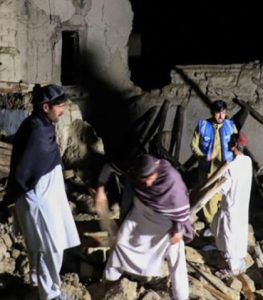Afghan community calls for international aid for quake victims
Afghans in Australia have called on the international community to step up humanitarian aid to the victims of the devastating earthquake in the Afghanistan’s Paktika province, which has left more than 1000 people dead.
Ghulum Rasool Karwan, who lived in Paktika province until September last year and who arrived in Australia via the dramatic military airlift, said that more help was needed from the international community.
 “Afghanistan’s government and authorities do not have the capacity to help all of the people affected by this. We need help from the international community,” he said.
“Afghanistan’s government and authorities do not have the capacity to help all of the people affected by this. We need help from the international community,” he said.
“It is a terrible situation. People have been killed, others are still under the rubble and thousands of families have lost their homes. There are also problems with access to food and water,” Mr Karwan said.
He said the earthquake came as the people of Afghanistan were already suffering a financial and humanitarian crisis.
“We already have a lot of problems in Afghanistan. There is a financial crisis and food insecurity because of drought and because foreign aid stopped when the Taliban took power,” Karwan said.
“A lot of people are struggling in Afghanistan and this just makes things worse.”
Mr Karwan said his house in Paktika had been damaged but not destroyed.
“Fortunately no one in my family has been lost or injured but many people in neighbouring districts have lost family members as well as their houses,” he said.
Afghan community leader Homaira Mershedi, who runs the Afghan Gallery café in Fitzroy, Melbourne, has been raising funds to support the earthquake victims.
“We were horrified when we heard the news,” she said
“For us, we had two options – to stand up and do something or just give up. So we decided we would help in any way we could. Since then we have received so many offers of support. It’s been overwhelming, in a good way. We are very happy to have been able to help and we plan to do more,” Ms Mershedi.
The earthquake struck on Tuesday killing at least 1000 people and injuring 1500 others in eastern Afghanistan.
The Taliban appealed for international help for the rescue effort as pictures showed landslides and ruined mud-built homes.
Hundreds of houses were destroyed by the magnitude 6.1 event, which occurred at a depth of 51km.
It is the deadliest earthquake to strike Afghanistan in two decades and a major challenge for the Taliban, the Islamist movement which regained power last year after the Western-backed government collapsed.
It struck about 44km from the city of Khost and tremors were felt as far away as Pakistan and India.
Witnesses reported feeling the quake in both Afghanistan’s capital, Kabul, and Pakistan’s capital, Islamabad.
Taliban officials asked the UN to “support them in terms of assessing the needs and responding to those affected”, a UNICEF spokesman said.
Earthquakes routinely cause significant damage in Afghanistan, where dwellings in many rural areas are unstable or poorly built.
Even before the Taliban takeover, Afghanistan’s emergency services were stretched to deal with natural disasters – with few aircraft and helicopters available to rescuers.
Communication following the quake is also difficult because of damage to mobile phone towers and the death toll could rise further.
Most of the casualties so far have been in the Gayan and Barmal districts with a whole village in Gayan destroyed.
Decades of conflict have made it difficult for the impoverished country to improve its protections against earthquakes and other natural disasters – despite efforts by aid agencies to reinforce some buildings over the years.
Afghanistan is prone to quakes, as it’s located in a tectonically active region, over a number of fault lines including the Chaman fault, the Hari Rud fault, the Central Badakhshan fault and the Darvaz fault.
Over the past decade more than 7,000 people have been killed in earthquakes in the country, according to the United Nations, and there are there are an average of 560 deaths a year from earthquakes.
Most recently, two quakes in the country’s west in January killed more than 20 people and destroyed hundreds of houses.












